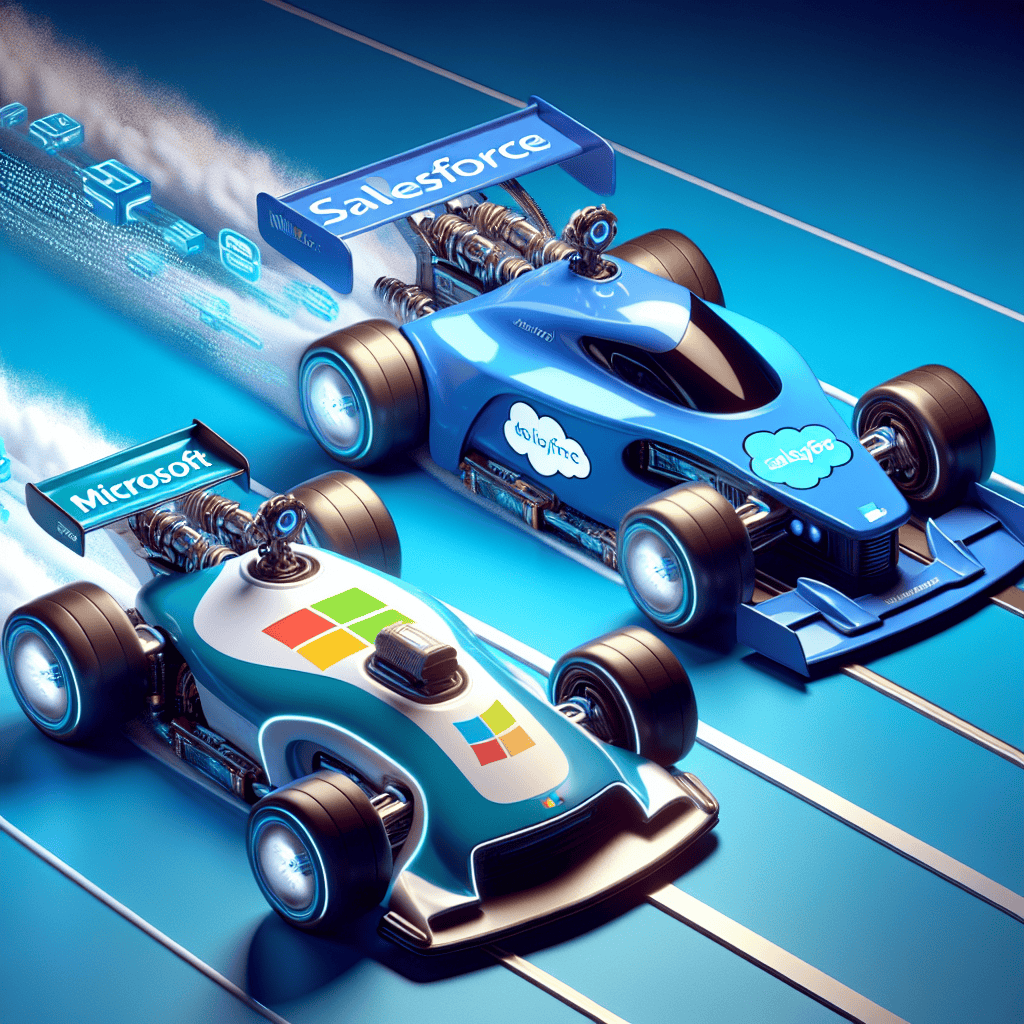“Microsoft and Salesforce: Pioneering the Future in the Autonomous Agent Arena.”
Introduction
In the rapidly evolving landscape of artificial intelligence, two tech giants, Microsoft and Salesforce, are intensifying their competition in the burgeoning field of autonomous agents. These companies are leveraging their vast resources and technological expertise to develop advanced AI-driven solutions that promise to revolutionize how businesses operate. Microsoft, with its robust Azure cloud platform and AI capabilities, is focusing on integrating autonomous agents into its suite of productivity and enterprise tools, aiming to enhance efficiency and decision-making processes. Meanwhile, Salesforce, renowned for its customer relationship management (CRM) prowess, is embedding AI agents into its ecosystem to provide more personalized and predictive customer experiences. As both companies vie for leadership in this transformative domain, their innovations are set to redefine industry standards and unlock new possibilities for automation and intelligent systems across various sectors.
Microsoft’s Strategic Moves in the Autonomous Agent Market
In the rapidly evolving landscape of technology, the race to develop advanced autonomous agents has become a focal point for industry giants. Among these, Microsoft and Salesforce stand out as key players, each leveraging their unique strengths to gain a competitive edge. Microsoft’s strategic maneuvers in this domain are particularly noteworthy, as the company seeks to solidify its position in the burgeoning market of autonomous agents.
To begin with, Microsoft’s approach is deeply rooted in its robust cloud infrastructure, Azure. By integrating autonomous agent capabilities with Azure, Microsoft aims to provide a seamless experience for businesses looking to automate complex processes. This integration not only enhances the functionality of Azure but also positions Microsoft as a leader in offering scalable and efficient solutions. Furthermore, the company’s investment in artificial intelligence research and development underscores its commitment to advancing autonomous technologies. Through initiatives like Microsoft Research, the company is exploring cutting-edge AI techniques that can be harnessed to improve the decision-making capabilities of autonomous agents.
In addition to leveraging its cloud platform, Microsoft is also focusing on strategic partnerships and acquisitions to bolster its position. Collaborations with leading AI research institutions and tech companies enable Microsoft to access a wider pool of expertise and resources. These partnerships are instrumental in accelerating the development of sophisticated autonomous agents that can operate across various industries. Moreover, Microsoft’s acquisition strategy is aimed at enhancing its technological capabilities. By acquiring companies with specialized expertise in AI and machine learning, Microsoft is able to integrate innovative technologies into its existing ecosystem, thereby enriching its autonomous agent offerings.
Transitioning to the competitive landscape, it is essential to consider how Microsoft’s strategies compare to those of Salesforce. While both companies are vying for dominance in the autonomous agent market, their approaches differ significantly. Salesforce, known for its customer relationship management (CRM) solutions, is focusing on embedding autonomous agents within its CRM platform. This strategy is designed to enhance customer interactions by automating routine tasks and providing personalized experiences. In contrast, Microsoft’s broader focus on cloud infrastructure and AI research allows it to target a wider range of applications beyond CRM.
Despite these differences, the competition between Microsoft and Salesforce is driving innovation in the field of autonomous agents. As both companies strive to outpace each other, they are pushing the boundaries of what these agents can achieve. This competitive pressure is beneficial for the industry as a whole, as it leads to the development of more advanced and capable autonomous systems. Consequently, businesses across various sectors stand to benefit from the enhanced efficiency and productivity that these technologies promise.
In conclusion, Microsoft’s strategic moves in the autonomous agent market reflect its ambition to lead in this transformative field. By capitalizing on its cloud infrastructure, investing in AI research, and pursuing strategic partnerships and acquisitions, Microsoft is well-positioned to make significant strides. As the competition with Salesforce intensifies, the advancements in autonomous agent technology are set to accelerate, offering exciting possibilities for the future of automation. Through these efforts, Microsoft not only aims to capture a significant share of the market but also to shape the future of autonomous systems in a way that aligns with its vision of empowering every person and organization on the planet to achieve more.
Salesforce’s Innovations in AI-driven Autonomous Solutions
In the rapidly evolving landscape of artificial intelligence, Salesforce has emerged as a formidable player, particularly in the realm of AI-driven autonomous solutions. As the competition with Microsoft intensifies, Salesforce is leveraging its robust platform to innovate and deliver cutting-edge technologies that promise to redefine the way businesses operate. At the heart of Salesforce’s strategy is its commitment to integrating AI into its existing suite of products, thereby enhancing their capabilities and providing users with more intelligent and autonomous tools.
Salesforce’s approach to AI-driven autonomous solutions is deeply rooted in its Einstein AI platform, which has been a cornerstone of its innovation strategy. By embedding AI into its customer relationship management (CRM) software, Salesforce enables businesses to automate routine tasks, predict customer needs, and personalize interactions at scale. This not only improves efficiency but also enhances the customer experience, a critical factor in today’s competitive market. Furthermore, Salesforce’s AI capabilities extend beyond CRM, offering solutions that cater to various industries, including finance, healthcare, and retail, thus broadening its impact and appeal.
In addition to enhancing existing products, Salesforce is also investing in the development of new autonomous solutions. One such innovation is the introduction of AI-driven chatbots that can handle customer inquiries with minimal human intervention. These chatbots are designed to understand and respond to complex queries, learning from each interaction to improve their performance over time. This capability is particularly valuable for businesses looking to scale their customer service operations without incurring significant additional costs.
Moreover, Salesforce is focusing on the integration of AI with Internet of Things (IoT) technologies to create more intelligent and responsive systems. By combining AI with IoT, Salesforce aims to provide businesses with real-time insights and predictive analytics that can drive more informed decision-making. This integration is particularly beneficial for industries such as manufacturing and logistics, where real-time data can significantly enhance operational efficiency and reduce downtime.
As Salesforce continues to innovate, it faces stiff competition from Microsoft, which is also making significant strides in the field of autonomous agents. Microsoft’s Azure AI platform and its suite of AI-driven tools are formidable competitors, offering similar capabilities and targeting the same market segments. However, Salesforce’s deep expertise in CRM and its strong focus on customer-centric solutions give it a unique edge in the race.
To maintain its competitive advantage, Salesforce is not only investing in technology but also in strategic partnerships and acquisitions. By collaborating with other tech companies and acquiring startups with complementary technologies, Salesforce is expanding its capabilities and accelerating its innovation cycle. This strategy not only enhances its product offerings but also positions Salesforce as a leader in the AI-driven autonomous solutions space.
In conclusion, Salesforce’s innovations in AI-driven autonomous solutions are reshaping the business landscape, offering companies new ways to enhance efficiency and improve customer experiences. As the competition with Microsoft intensifies, Salesforce’s focus on integrating AI into its core products, developing new autonomous solutions, and leveraging strategic partnerships will be crucial in maintaining its leadership position. As businesses increasingly adopt AI technologies, Salesforce’s commitment to innovation and customer-centric solutions will likely continue to drive its success in this dynamic and competitive market.
Comparing Microsoft’s and Salesforce’s AI Technologies
In the rapidly evolving landscape of artificial intelligence, Microsoft and Salesforce have emerged as formidable competitors, each striving to outpace the other in the development of autonomous agents. These technologies, which are designed to perform tasks with minimal human intervention, are becoming increasingly integral to business operations. As both companies continue to innovate, it is essential to compare their AI technologies to understand the nuances of their approaches and the implications for the future of autonomous agents.
Microsoft, a pioneer in the tech industry, has leveraged its extensive resources and expertise to develop a robust AI platform. Central to Microsoft’s strategy is its Azure AI services, which provide a comprehensive suite of tools for building, deploying, and managing AI applications. Azure’s capabilities are enhanced by Microsoft’s investment in OpenAI, which has led to the integration of advanced language models like GPT-3 into its offerings. This collaboration has enabled Microsoft to deliver powerful natural language processing (NLP) solutions, allowing businesses to automate customer service, generate content, and analyze data with unprecedented accuracy.
In contrast, Salesforce has focused on embedding AI into its customer relationship management (CRM) platform through its Einstein AI. This approach allows Salesforce to offer AI-driven insights directly within its CRM ecosystem, providing users with predictive analytics, intelligent recommendations, and automated workflows. By integrating AI into its core products, Salesforce aims to enhance user productivity and improve customer experiences. Furthermore, Salesforce’s acquisition of Tableau has strengthened its data visualization capabilities, enabling users to derive actionable insights from complex datasets.
While both companies have made significant strides in AI, their strategies differ in key areas. Microsoft’s emphasis on cloud-based AI services positions it as a versatile provider capable of catering to a wide range of industries. The scalability and flexibility of Azure AI make it an attractive option for businesses seeking to implement AI solutions across various domains. Moreover, Microsoft’s focus on ethical AI development, as evidenced by its AI for Good initiative, underscores its commitment to responsible innovation.
On the other hand, Salesforce’s strategy of integrating AI into its CRM platform reflects its dedication to enhancing customer-centric solutions. By embedding AI directly into its products, Salesforce ensures that users can seamlessly access AI-driven insights without the need for additional infrastructure. This approach not only simplifies the adoption of AI but also aligns with Salesforce’s mission to empower businesses to build stronger customer relationships.
As the competition between Microsoft and Salesforce intensifies, it is important to consider the broader implications of their AI technologies. The development of autonomous agents has the potential to transform industries by automating routine tasks, improving decision-making, and driving innovation. However, it also raises questions about data privacy, security, and the ethical use of AI. Both companies have acknowledged these concerns and are actively working to address them through transparent practices and robust security measures.
In conclusion, the race between Microsoft and Salesforce in the realm of autonomous agents is a testament to the transformative power of AI. While their approaches differ, both companies are committed to advancing AI technologies that enhance business operations and improve customer experiences. As they continue to innovate, the competition will likely spur further advancements in AI, ultimately benefiting businesses and consumers alike. The future of autonomous agents is promising, and the ongoing rivalry between these tech giants will undoubtedly shape the trajectory of AI development in the years to come.
The Impact of Autonomous Agents on Enterprise Solutions

In recent years, the landscape of enterprise solutions has been dramatically reshaped by the advent of autonomous agents, with industry giants like Microsoft and Salesforce at the forefront of this technological revolution. These autonomous agents, powered by advanced artificial intelligence and machine learning algorithms, are designed to perform tasks with minimal human intervention, thereby enhancing efficiency and productivity within organizations. As the competition between Microsoft and Salesforce intensifies, the impact of these autonomous agents on enterprise solutions becomes increasingly significant.
To begin with, autonomous agents are transforming the way businesses operate by automating routine tasks and processes. This automation not only reduces the time and effort required for mundane activities but also allows employees to focus on more strategic and creative endeavors. For instance, Microsoft’s integration of autonomous agents into its suite of enterprise solutions, such as Microsoft Dynamics 365, enables businesses to streamline operations by automating customer service interactions, data entry, and even predictive analytics. Similarly, Salesforce has been leveraging its Einstein AI to empower its autonomous agents, which assist in customer relationship management by providing personalized recommendations and insights.
Moreover, the deployment of autonomous agents is leading to a paradigm shift in decision-making processes within enterprises. These agents are capable of analyzing vast amounts of data in real-time, offering actionable insights that can drive informed decision-making. As a result, businesses are able to respond more swiftly to market changes and customer demands. For example, Salesforce’s autonomous agents can analyze customer interactions and feedback to predict future trends, allowing companies to tailor their strategies accordingly. Meanwhile, Microsoft’s agents are adept at identifying patterns and anomalies in data, which can be crucial for risk management and operational efficiency.
In addition to enhancing operational efficiency and decision-making, autonomous agents are also playing a pivotal role in improving customer experiences. By providing instant, accurate, and personalized responses, these agents are revolutionizing customer service. Microsoft’s virtual agents, for instance, are capable of handling a wide range of customer queries, thereby reducing wait times and improving satisfaction levels. On the other hand, Salesforce’s autonomous agents are designed to offer seamless integration across various communication channels, ensuring that customers receive consistent and coherent support regardless of the platform they choose to engage with.
However, the rise of autonomous agents is not without its challenges. As Microsoft and Salesforce continue to innovate and expand their capabilities, concerns regarding data privacy and security have come to the forefront. Enterprises must ensure that the deployment of these agents complies with regulatory standards and safeguards sensitive information. Both companies are investing heavily in enhancing the security features of their autonomous agents, but the evolving nature of cyber threats necessitates continuous vigilance and adaptation.
Furthermore, the integration of autonomous agents into existing enterprise systems requires careful planning and execution. Organizations must assess their current infrastructure and determine the most effective way to incorporate these agents without disrupting ongoing operations. This often involves a significant investment in training and development to ensure that employees are equipped to work alongside these advanced technologies.
In conclusion, the competition between Microsoft and Salesforce in the realm of autonomous agents is driving significant advancements in enterprise solutions. As these agents become more sophisticated, they are poised to revolutionize business operations, decision-making, and customer interactions. While challenges remain, the potential benefits of autonomous agents are undeniable, promising a future where enterprises can operate with unprecedented efficiency and agility. As this race continues, it will be crucial for businesses to stay informed and adaptable, leveraging the capabilities of autonomous agents to maintain a competitive edge in an ever-evolving market.
Key Challenges in the Microsoft vs. Salesforce AI Competition
In the rapidly evolving landscape of artificial intelligence, Microsoft and Salesforce have emerged as formidable competitors, each striving to outpace the other in the development of autonomous agents. These agents, designed to perform tasks with minimal human intervention, represent a significant leap forward in AI technology. However, the race to dominate this sector is fraught with challenges that both companies must navigate to maintain their competitive edge.
One of the primary challenges facing Microsoft and Salesforce is the integration of autonomous agents into existing business ecosystems. Both companies have established extensive software platforms that are deeply embedded in the operations of countless organizations worldwide. The task of seamlessly incorporating autonomous agents into these platforms without disrupting existing workflows is a complex undertaking. Microsoft, with its Azure cloud services and Office 365 suite, and Salesforce, with its robust customer relationship management (CRM) solutions, must ensure that their AI offerings enhance rather than hinder productivity. This requires a delicate balance between innovation and stability, as businesses are often wary of adopting new technologies that could potentially disrupt their operations.
Moreover, the development of autonomous agents necessitates significant advancements in machine learning and natural language processing. These technologies are critical for enabling agents to understand and respond to human inputs effectively. Microsoft and Salesforce are investing heavily in research and development to push the boundaries of what is possible in these fields. However, the challenge lies not only in creating sophisticated algorithms but also in ensuring that these algorithms can operate efficiently at scale. As the demand for AI-driven solutions grows, both companies must address the computational and infrastructural demands of deploying these technologies across diverse industries.
Another significant hurdle in the competition between Microsoft and Salesforce is data privacy and security. Autonomous agents, by their nature, require access to vast amounts of data to function optimally. This raises concerns about how data is collected, stored, and used, particularly in light of stringent regulations such as the General Data Protection Regulation (GDPR) in Europe. Both companies must navigate these regulatory landscapes carefully, ensuring that their AI solutions comply with legal requirements while also maintaining the trust of their customers. This involves implementing robust security measures and transparent data handling practices, which can be both technically challenging and resource-intensive.
Furthermore, the ethical implications of deploying autonomous agents cannot be overlooked. As these technologies become more prevalent, questions arise about the potential impact on employment, decision-making processes, and societal norms. Microsoft and Salesforce must consider the broader implications of their AI developments, ensuring that their technologies are used responsibly and do not inadvertently perpetuate biases or inequalities. This requires a commitment to ethical AI practices, including the development of guidelines and frameworks that promote fairness and accountability.
In conclusion, the competition between Microsoft and Salesforce in the realm of autonomous agents is characterized by a series of complex challenges. From integrating AI into existing systems and advancing machine learning capabilities to addressing data privacy concerns and ethical considerations, both companies must navigate a multifaceted landscape to succeed. As they continue to innovate and push the boundaries of what is possible with AI, the outcomes of this competition will undoubtedly shape the future of technology and its role in society.
Future Trends in Autonomous Agents for Business Applications
In the rapidly evolving landscape of business technology, the competition between Microsoft and Salesforce in the realm of autonomous agents is becoming increasingly intense. As both companies strive to enhance their offerings, the future of business applications is poised for significant transformation. Autonomous agents, which are AI-driven systems capable of performing tasks without human intervention, are at the forefront of this technological revolution. These agents promise to streamline operations, improve efficiency, and provide businesses with a competitive edge.
Microsoft, a longstanding leader in software development, has been investing heavily in artificial intelligence and machine learning to bolster its autonomous agent capabilities. The company’s Azure platform serves as a robust foundation for developing and deploying these intelligent systems. By leveraging Azure’s cloud infrastructure, Microsoft aims to provide businesses with scalable and flexible solutions that can be tailored to specific needs. Furthermore, Microsoft’s integration of AI into its suite of productivity tools, such as Microsoft 365, exemplifies its commitment to embedding autonomous agents into everyday business processes. This integration not only enhances productivity but also enables businesses to harness the power of AI to gain insights and make data-driven decisions.
On the other hand, Salesforce, renowned for its customer relationship management (CRM) solutions, is also making significant strides in the autonomous agent arena. With its Einstein AI platform, Salesforce is embedding intelligence into its CRM offerings, allowing businesses to automate routine tasks and focus on strategic initiatives. Einstein’s capabilities extend beyond simple automation; it provides predictive analytics and personalized recommendations, thereby enabling businesses to anticipate customer needs and deliver tailored experiences. As Salesforce continues to innovate, its autonomous agents are becoming indispensable tools for businesses seeking to enhance customer engagement and drive growth.
The competition between Microsoft and Salesforce is not merely a battle of technological prowess; it is also a race to capture market share in a rapidly expanding industry. As businesses increasingly recognize the value of autonomous agents, the demand for sophisticated AI solutions is surging. Both companies are acutely aware of this trend and are investing in research and development to stay ahead of the curve. This competitive dynamic is fostering an environment of rapid innovation, with each company striving to outdo the other in terms of functionality, ease of use, and integration capabilities.
Moreover, the implications of this competition extend beyond the immediate benefits to businesses. As Microsoft and Salesforce push the boundaries of what autonomous agents can achieve, they are also setting new standards for ethical AI deployment. Issues such as data privacy, algorithmic bias, and transparency are becoming central to the conversation, prompting both companies to adopt responsible AI practices. This focus on ethical considerations is crucial, as it ensures that the deployment of autonomous agents aligns with societal values and fosters trust among users.
In conclusion, the intensifying competition between Microsoft and Salesforce in the autonomous agent space is shaping the future of business applications. As both companies continue to innovate and refine their offerings, businesses stand to benefit from enhanced efficiency, improved customer experiences, and data-driven insights. The race to develop superior autonomous agents is not only transforming the business landscape but also setting the stage for a future where AI-driven systems play an integral role in organizational success. As this competition unfolds, it will be fascinating to observe how Microsoft and Salesforce navigate the challenges and opportunities that lie ahead, ultimately redefining the possibilities of autonomous agents in business applications.
Case Studies: Successful Implementations of Autonomous Agents by Microsoft and Salesforce
In the rapidly evolving landscape of artificial intelligence, Microsoft and Salesforce have emerged as formidable competitors, each striving to lead the charge in the development and implementation of autonomous agents. These sophisticated systems, designed to perform tasks with minimal human intervention, are transforming industries by enhancing efficiency and productivity. As the race intensifies, both companies have showcased successful implementations that highlight their unique approaches and technological prowess.
Microsoft, a pioneer in AI technology, has leveraged its Azure cloud platform to deploy autonomous agents across various sectors. One notable case study involves the integration of autonomous agents in supply chain management. By utilizing machine learning algorithms and real-time data analytics, Microsoft has enabled companies to optimize inventory levels, predict demand fluctuations, and streamline logistics operations. This has resulted in significant cost savings and improved service delivery for businesses. Furthermore, Microsoft’s autonomous agents have been instrumental in enhancing customer service experiences. Through natural language processing and sentiment analysis, these agents can understand and respond to customer inquiries with remarkable accuracy, thereby reducing response times and increasing customer satisfaction.
On the other hand, Salesforce has carved a niche for itself by focusing on customer relationship management (CRM) solutions. Its autonomous agents, powered by the Einstein AI platform, have revolutionized the way businesses interact with their customers. A compelling example of this is the implementation of autonomous agents in sales forecasting. By analyzing historical data and market trends, Salesforce’s agents can provide sales teams with precise predictions, enabling them to make informed decisions and allocate resources more effectively. This has not only boosted sales performance but also enhanced strategic planning for organizations. Additionally, Salesforce’s autonomous agents have been deployed in marketing automation, where they personalize customer interactions by analyzing behavior patterns and preferences. This targeted approach has led to higher engagement rates and improved conversion metrics for businesses.
While both Microsoft and Salesforce have demonstrated remarkable success in their respective domains, their strategies differ in terms of scalability and integration. Microsoft’s focus on a broad range of industries allows for versatile applications of its autonomous agents, making it a preferred choice for companies seeking comprehensive solutions. In contrast, Salesforce’s specialization in CRM provides a more tailored approach, appealing to businesses that prioritize customer-centric strategies. Despite these differences, both companies share a commitment to ethical AI practices, ensuring that their autonomous agents operate transparently and responsibly.
As the competition between Microsoft and Salesforce continues to intensify, the implications for businesses are profound. The successful implementation of autonomous agents not only enhances operational efficiency but also drives innovation and growth. Companies that adopt these technologies can gain a competitive edge by leveraging data-driven insights and automating routine tasks. Moreover, the collaboration between human employees and autonomous agents fosters a dynamic work environment, where creativity and strategic thinking are amplified.
In conclusion, the case studies of Microsoft and Salesforce underscore the transformative potential of autonomous agents in today’s business landscape. By harnessing the power of AI, these companies are setting new benchmarks for efficiency and customer engagement. As they continue to innovate and refine their technologies, the future of autonomous agents promises to be both exciting and impactful, reshaping industries and redefining the way businesses operate.
Q&A
1. **What is the focus of Microsoft and Salesforce in the autonomous agent race?**
Both companies are focusing on developing advanced AI-driven autonomous agents to enhance productivity and automate business processes.
2. **How is Microsoft advancing its autonomous agent technology?**
Microsoft is leveraging its Azure cloud platform and integrating AI capabilities from its acquisition of OpenAI to enhance its autonomous agent offerings.
3. **What is Salesforce’s approach to autonomous agents?**
Salesforce is integrating AI into its CRM platform, using its Einstein AI to create intelligent agents that can automate customer interactions and business workflows.
4. **What are the key industries targeted by these autonomous agents?**
Key industries include customer service, sales, marketing, and IT operations, where automation can significantly improve efficiency and customer satisfaction.
5. **How do these companies differentiate their autonomous agent solutions?**
Microsoft focuses on seamless integration with its existing suite of productivity tools, while Salesforce emphasizes its deep CRM capabilities and industry-specific solutions.
6. **What are the potential benefits of using autonomous agents for businesses?**
Benefits include increased efficiency, reduced operational costs, improved customer experiences, and the ability to scale operations without proportional increases in resources.
7. **What challenges do Microsoft and Salesforce face in this race?**
Challenges include ensuring data privacy and security, managing the complexity of AI integration, and staying ahead of competitors in a rapidly evolving technological landscape.
Conclusion
Microsoft and Salesforce are intensifying their competition in the autonomous agent race by leveraging their respective strengths in cloud computing, artificial intelligence, and customer relationship management. Microsoft, with its Azure cloud platform and AI capabilities, is focusing on integrating autonomous agents into its suite of productivity and enterprise solutions, enhancing automation and efficiency for businesses. Salesforce, on the other hand, is capitalizing on its CRM expertise and AI-driven Einstein platform to offer intelligent, automated customer interactions and personalized experiences. Both companies are investing heavily in research and development to advance their autonomous technologies, aiming to capture a larger share of the growing market for AI-driven business solutions. As they continue to innovate and expand their offerings, the competition between Microsoft and Salesforce is likely to drive significant advancements in the field of autonomous agents, benefiting businesses seeking to enhance operational efficiency and customer engagement.





